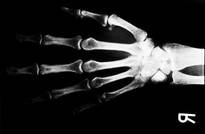
Martinsried (Germany), August 26, 2015 – Four medium-sized companies and two partners from academia have joined forces to develop a bone adhesive from biopolymers. With this, it should be possible to fix fractures in the low-load range (e.g. at the face or hand) without the use of implants. The project was initiated by IBB Netzwerk GmbH and the German Federal Ministry for Economic Affairs and Energy (BMWi) supports the project for three years by funding. The kick-off meeting took place on July 30, 2015. Upon successful course of the project, clinical studies with a product candidate will be pursued afterwards.
With bone injuries such as bone fractures, it is often necessary to fix individual parts of the bone. Thus, the bones grow together and can be strained more quickly. By default, screws and other implants are used so far. The partners of the research project “bone adhesive” now follow an innovative and mild approach. They pursue the development of a biopolymer, which can be applied to the bone parts and bonds these together. The porous polymer is replaced over time by regenerating bone material and the resulting degradation products can be disposed by the body. The procedure should be possible even with complicated fractures in the low-load range. The aim is further to reduce the risk of post-operative complications using a minor intervention and to avoid a second intervention for implant removal.
The use in the human body poses high demands on the biopolymer. The material must be biocompatible without toxic components or toxic degradation products. It also needs to adhere very well in the presence of body fluids such as blood and synovial liquid. In order to ensure all this, the project is divided into three phases: After the development of appropriate product candidates, compatibility assessments are carried out in cell cultures. In the last phase, investigations will take place in the animal model.
Besides the Institute of Orthopaedic Research and Biomechanics at the University of Ulm and the German University of Cairo, four small and medium-sized companies from Germany are involved in the project – FABES Forschungs-GmbH (Munich), InnoTERE GmbH (Radebeul), provenion GmbH (Kirchseeon) and Unavera ChemLab GmbH (Mittenwald). The project is funded by the German Federal Ministry for Economic Affairs and Energy as part of the Central Innovation Program for SME. The expected project costs are around 1.2 million Euros – 50% of the costs will be covered by the funding. The project was initiated by the IBB Netzwerk GmbH within its cooperation network “BioPlastik”.
About the Central Innovation Program for SME and about “BioPlastik”
The Central Innovation Program for SME (Zentrales Innovationsprogramm Mittelstand, ZIM) is a German funding program for small and medium-sized enterprises (SME) and partners from academia. The program is open for all technologies and industrial sectors. Within this program, IBB Netzwerk GmbH built up the cooperation network “BioPlastik” with duration from January 2014 to December 2016. In this time, projects with high ecological relevance should be initiated. Within the network, the partners of the ZIM-project “bone adhesive” joint forces.
Food packaging, bags, toys and functional textiles – all these products typically contain petro-based plastics. Because of their persistence in nature, these plastics are badly degraded. The degradation products accumulate as environmentally harmful plastic waste, for example in the sea. Therefore, the 20 partners of the cooperation network “BioPlastik” carry out technical projects to develop innovative, bio-based, bio-degradable and at the same time low-priced biopolymers. Bioplastic materials – in particular materials from the so far hardly marketed polyhydroxyalkanoates (PHA) – will thus gain significant market shares in mass products. In addition, the partners pursue high sustainability criteria in the production of the biopolymers and the materials themselves. More information at www.netzwerk-bioplastik.de.
About Industrielle Biotechnologie Bayern Netzwerk GmbH (IBB Netzwerk GmbH)
IBB Netzwerk GmbH is a network and service organization in the field of Industrial Biotechnology. The aim is to catalyze the conversion of valuable scientific knowledge into innovative, marketable products and processes. IBB Netzwerk GmbH performs the management of the ZIM cooperation network “BioPlastik”, acquires partners and supports the partners in the development of research and development projects. The company is located in Martinsried near Munich, Germany.
Source
IBB Netzwerk GmbH, press release, 2015-08-26.
Supplier
Bundesministerium für Wirtschaft und Energie (BMWI)
FABES Forschungs-GmbH
German University of Cairo
Industrielle Biotechnologie Bayern Netzwerk GmbH (IBB Netzwerk GmbH)
InnoTERE GmbH
provenion GmbH
Unavera ChemLab GmbH
Universitätsklinikum Ulm
ZIM-Kooperationsnetzwerk
Share
Renewable Carbon News – Daily Newsletter
Subscribe to our daily email newsletter – the world's leading newsletter on renewable materials and chemicals










